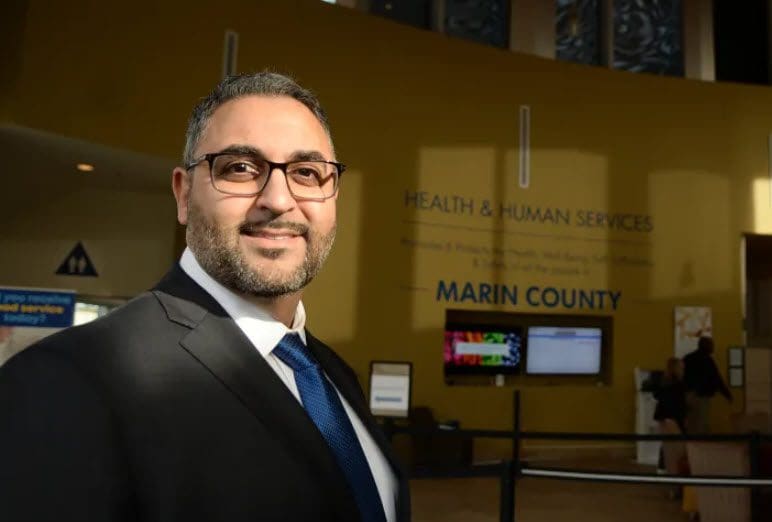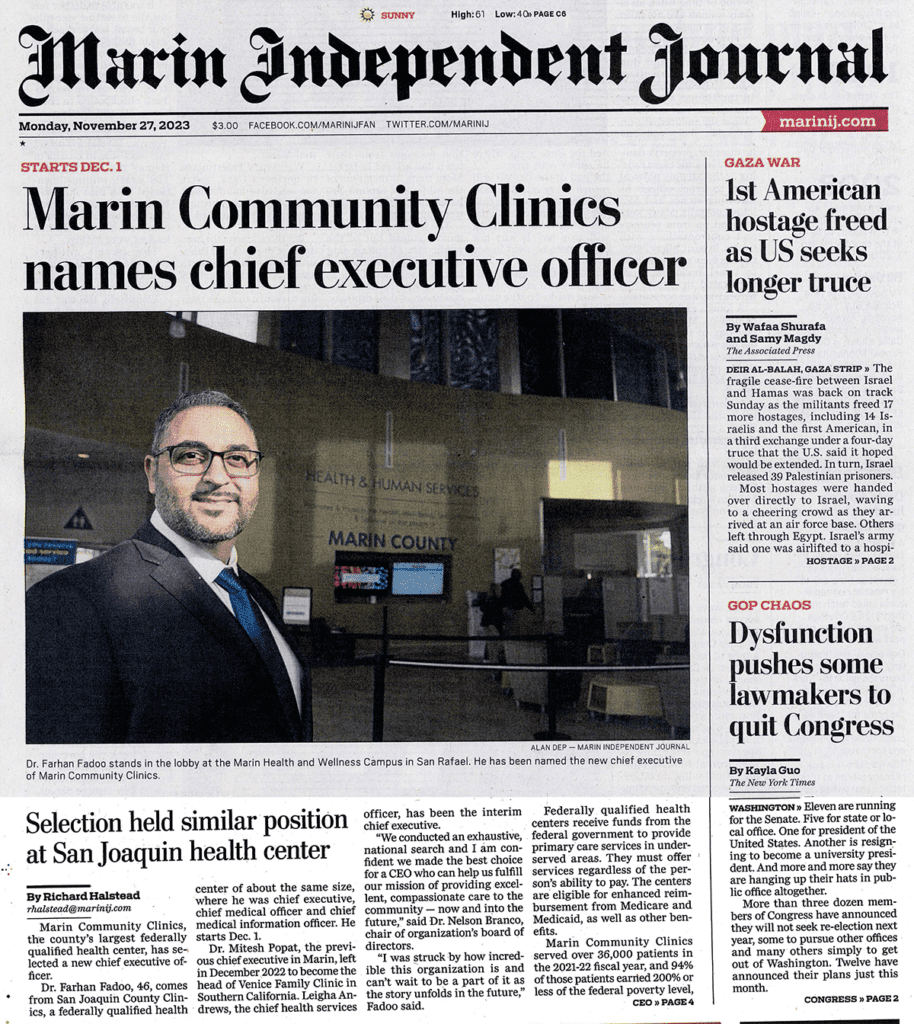Marin Community Clinics names new chief executive
By RICHARD HALSTEAD | rhalstead@marinij.com | Marin Independent Journal
November 26, 2023 at 7:41 p.m.

Marin Community Clinics, the county’s largest federally qualified health center, has selected a new chief executive officer.
Dr. Farhan Fadoo, 46, comes from San Joaquin County Clinics, a federally qualified health center of about the same size, where he was chief executive, chief medical officer and chief medical information officer. He starts Dec. 1.
Dr. Mitesh Popat, the previous chief executive, left in December 2022 to become the head of Venice Family Clinic in Southern California. Leigha Andrews, the chief health services officer, has been the interim chief executive.
“We conducted an exhaustive, national search and I am confident we made the best choice for a CEO who can help us fulfill our mission of providing excellent, compassionate care to the community – now and into the future,” said Dr. Nelson Branco, chair of organization’s board of directors.
“I was struck by how incredible this organization is and can’t wait to be a part of it as the story unfolds in the future,” Fadoo said.
Federally qualified health centers receive funds from the federal government to provide primary care services in underserved areas. They must offer services regardless of the person’s ability to pay. The centers are eligible for enhanced reimbursement from Medicare and Medicaid, as well as other benefits.
Marin Community Clinics served over 36,000 patients in the 2021-22 fiscal year, and 94% of those patients earned 200% or less of the federal poverty level, which is just over $29,000 annually for one person.
This month, MCC announced it has completed a multiyear capital campaign raising just over $7 million.
The money has been used to open a new facility at 1260 S. Eliseo Drive in Greenbrae and a new telehealth-focused medical and behavioral health clinic at 1618 Second St. in San Rafael. Expansion and renovation of the dental clinic at 411 Fourth St. in San Rafael is expected to be completed early next year.
Fadoo received his medical degree from the University of California, San Francisco. He also holds two master’s degrees: one in neurophysiology from the University of California, Davis, and the other in health informatics from the University of Illinois, Chicago. Health informatics is the study and use of computers and algorithms to improve communication, understanding and management of medical information.
He said that in October 2022, MCC switched electronic health records software from NextGen to Epic.
“That might explain why they were so interested in me,” Fadoo said, “on the heels of this major conversion I was the guy that had more than surface expertise in that kind of a thing.”
Fadoo said when he was studying health informatics in the early 2000s, “the health care industry was analog, still very manual and behind the times in terms of leveraging digital tools.”
“We were still using paper charts in those days,” Fadoo said. “The delivery of health care was fragmented. It was hard to know what was happening to your patients when they weren’t inside your four walls.”
Fadoo’s father is a software engineer. “So I do think my dad had some role in planting that seed,” he said.
His parents emigrated from Pakistan to the United States in the 1970s. He was born in San Francisco in 1977.
San Joaquin County Clinics’ saw revenue grow under Fadoo’s leadership. After suffering a net loss of $18 million in fiscal 2019, the clinic recorded net income of $14.7 million in fiscal 2020. The clinics’ average monthly billable visits increased by 10% during this period despite the COVID-19 pandemic.
Fadoo said that in 2021, San Joaquin County Clinics split from San Joaquin General Hospital and became an affiliate of San Joaquin County, allowing it to expand services throughout the broader Central Valley.
One of the things that attracted Fadoo to the Clinics was the fact that it is a private nonprofit organization.
“I wanted to return to the private sector, that was a key objective,” Fadoo said. “I tend to be somewhat intolerant of the status quo, wanting to innovate, wanting to solve problems, wanting to grow and meet the needs of the community. The public sector and innovation and being nimble are not always necessarily aligned.”
Fadoo said he has met with Popat and previous Marin clinic managers.
“They’ve done an incredible job,” he said, “but there’s still a lot more unmet need and a shifting need that’s occurring in the community with an aging population.”
According to the results of a recent study commissioned by Marin County, the number of older Latino residents in the county is projected to increase 518% between 2010 and 2040. The results of the study, conducted by Githens & Associates, was reported to county supervisors in February.
Fadoo said about 50% to 60% of Marin Community Clinics’ patients are primarily Spanish speaking.
Fadoo said a multiyear initiative by the state to improve the quality of life and health outcomes of people on Medi-Cal, California Advancing and Innovating Medi-Cal, known as CalAIM, will provide opportunities for Marin Community Clinics to grow and diversity, “getting more into social service delivery.”
As a result of CalAIM, Medi-Cal is now funding non-clinical services that recognize social determinants of health, such as access to housing and healthy food.
MCC has already received at least $1 million in CalAim funding. It used $500,000 to make its electronic health records conversion, and is using the remainder to help patients stay housed or find housing, and to provide enhanced case management for patients.
While MCC has many new opportunities for growth, its biggest challenge is the same that all health care organizations are facing, Fadoo said.
“I would say workforce is the key challenge,” he said, “the shortage of access to primary care providers, enough soldiers to meet the immense need that exists in the community.”

